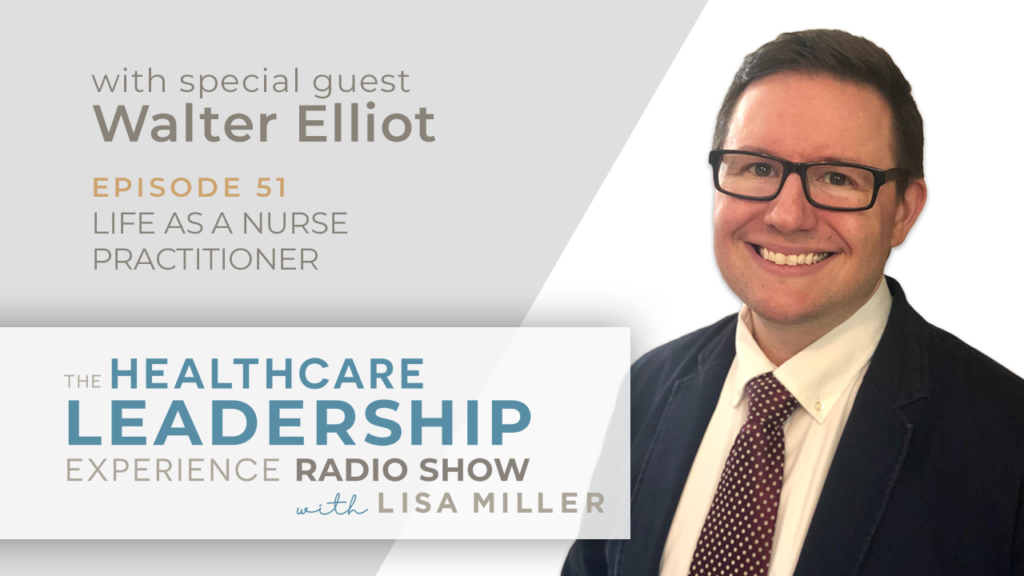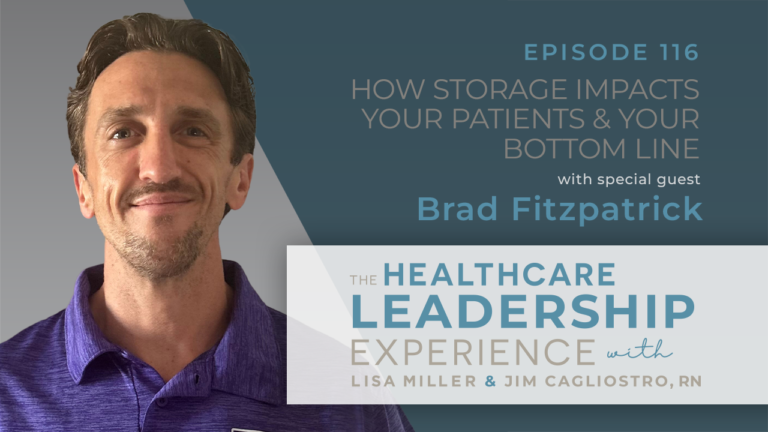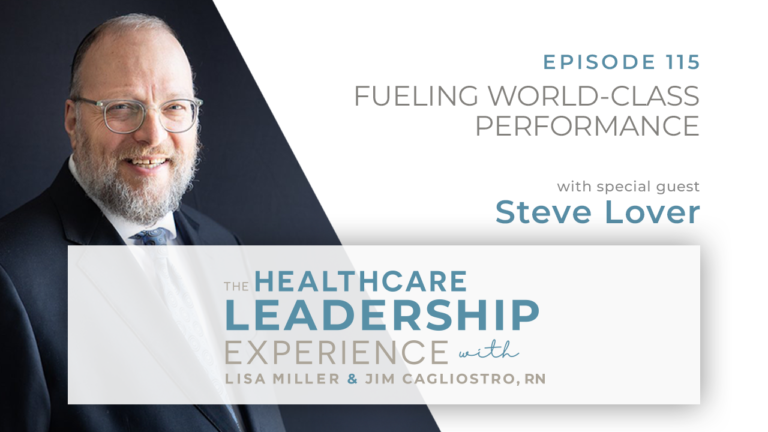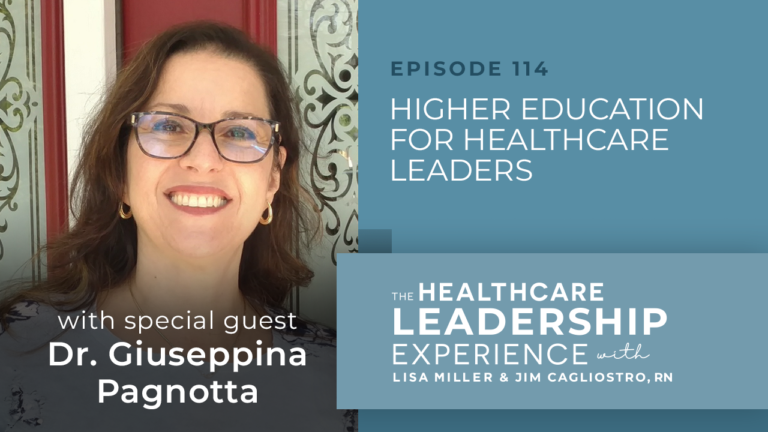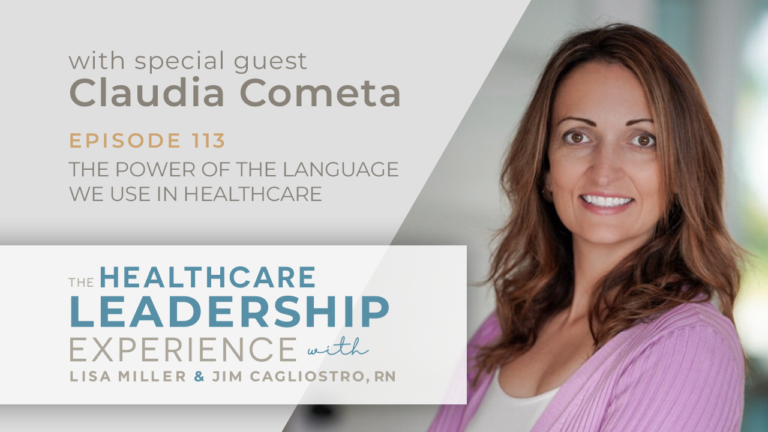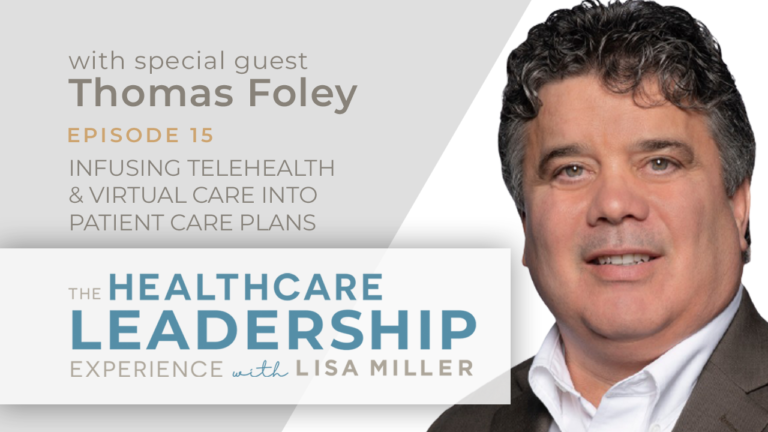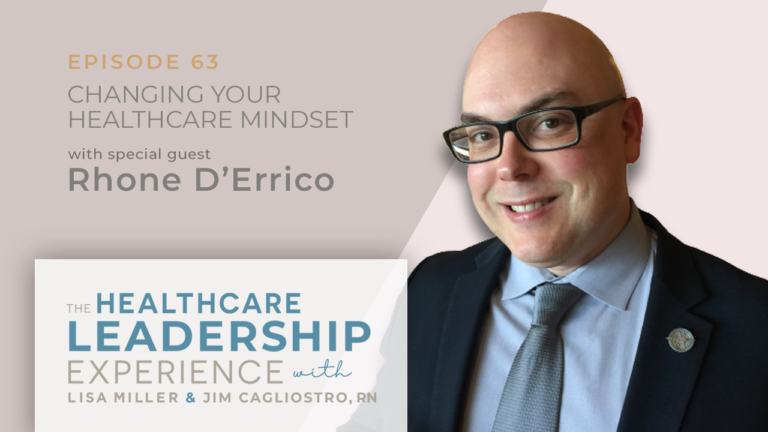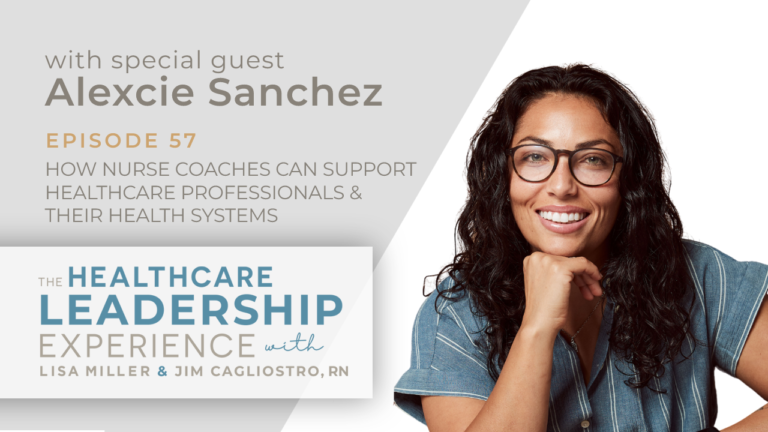In Episode 51 of The Healthcare Leadership Experience Jim Cagliostro is joined by Walter ‘’Buddy’’ Elliott, a nurse practitioner for the phase one cancer clinical research program for Hackensack Meridian Health, to explore the reality of nursing.
Episode Introduction
The role of a nurse practitioner has changed in recent years. In this episode, Jim Cagliostro, VIE’s Clinical Operations Performance Improvement Expert, interviewed Walter ‘’Buddy’’ Elliott to discuss the benefits of previous ‘’hands-on’’ nursing experience for nurse practitioners, the critical role they play in enhancing the patient experience, and the support they offer physicians.
Show Topics
- “Bedside nursing’’ experience is essential for nurse practitioners
- Identifying prospective patients for clinical trials
- The in-depth knowledge required for cancer studies
- From cost savings to better patient care
- Drawing on the expertise of more experienced nurses
- Nurse practitioners enhance the patient experience
- Achieving formal qualifications through multiple routes
04:35 ‘’Bedside nursing’’ experience is essential for nurse practitioners
Based on his personal experience, Walter said hands-on nursing care provides vital experience for nurse practitioners.
“I definitely feel it is essential as a nurse practitioner to have had experience in nursing because as a floor nurse, you have increased access to being able to see how care is carried out. From the orders that are placed and the management of the patients’ care, being able to watch a patient’s vitals and how a patient is reacting to a certain treatment and being that first line of being able to counter anything that would be negatively impacting the patient. Being able to have the access of seeing multiple different types of disease processes and modalities of care, I think definitely increases the experience for a nurse practitioner to be able to draw off of. So I definitely feel it is important to have had a couple of years or more of nursing, hands-on nursing care, before pursuing nurse practitioner roles just because it allows you to have that experience.”
06:21 Identifying prospective patients for clinical trials
Walter outlined his involvement as a nurse practitioner in identifying patients for clinical trials.
“Well speaking for myself personally, in research, my role as the nurse practitioner whenever a prospective patient is identified or referred to our program, my job is to help identify the appropriate enrolling study for their disease process and then to help evaluate their eligibility based off the criteria of the prospective trial. We work primarily in solid tumors so anything such as non-small cell lung cancer, colorectal cancer, those being examples of disease processes that we see, I help look at what’s available for them because trials open and close based off of how many they’ve been able to enroll in a cohort and then I can say, “We have these three open trials that would be available for you. We would like you to review the consent, the process, of what you would be undertaking in this clinical trial.” And then meet back up with the patient in the screening process to determine whether they would like to sign and then go on from there.”
08:18 The in-depth knowledge required for cancer studies
Walter outlined the complex nature of working as a nurse practitioner on cancer treatment trials.
“I definitely feel now that there are a number of different roles that a nurse practitioner is able to help fill. The research role is in and of itself a different avenue that beforehand I wasn’t aware of but intrigued me as I became more aware of what the position entailed, mainly because of the in-depth knowledge that’s required of the available studies. What the study is comprised of, what the treatment modality is, what’s being investigated, what criteria has been set up to find a patient. Sometimes there can be a criteria that’s very restrictive and it’s only a very small subset of people with a particular disease process that would be eligible for. Sometimes they’re any and all solid tumors that come in and so just being able to know what each study entails is essential for my role. And then being able to understand how that study would impact the patient and identify any issues that could arise during their care.”
12:11 From cost savings to better patient care
Jim said that the role of nurse practitioner leads to fewer emergency room visits and more cost effective treatment.
“In recent research that I’ve done and I’ve been talking with some of our clients, the studies have shown that nurse practitioners, and it’s pretty obvious most people would know this, that nurse practitioners cost healthcare systems less. They’re less expensive to see for the patient and for the healthcare system, so that overall helps to decrease the cost of healthcare services. And then I know you don’t want to toot your own horn but I’ll brag on nurse practitioners in this way, another study showed that patients who saw nurse practitioners had fewer emergency room visits, had shorter hospital stays, and overall lowered the treatment of their cost. So there’s a number of things. And that could be a whole other podcast about the benefits of having nurse practitioners as part of a health system.”
15:40 Drawing on the expertise of more experienced nurses
Walter said continued access to a mentor can help nurse practitioners to grow in their role.
“I’m working closely with a nurse practitioner that has been with the John Theurer Cancer Center phase one clinical trial department for a number of years. And phenomenal amount of knowledge and experience that I reap from her. And with my previous position as well, I have worked with senior nurse practitioners that are just incredible assets to their practice because of their wealth of experience and knowledge. I do think it’s important that newer nurse practitioners be able to have that access. And I know that with the John Theurer Cancer Center, I’ve seen that at play with precessing opportunities and just newer individuals in the field being able to work with established nurse practitioners. I definitely feel like it helps us grow in the position to be able to draw from somebody who’s in the field themselves, doing well in it, and providing safe care for patients. So I definitely think it’s important for continued access to be a part of the curriculum. And then also, just as getting a mentor especially as you move into the field to be able to reach out to and say, “Hey, this is something new that I’m dealing with.” Or, “How would you troubleshoot this situation.”
18:53 Nurse practitioners enhance the patient experience
Walter said the ability to expand access to patient care and offer solutions influenced his decision to become a nurse practitioner.
“I was intrigued at the additional level of care that these individuals brought to the patients’ experience. I noticed that they had more of an ability to connect with the patients, be able to meet their needs. And their ease of contact as a provider, they were able to work more closely with the nursing staff. Which in my own experience, I was grateful for, because I could easily call someone and know that they would be able to help me in a particular situation. They would be able to provide a solution more quickly due to their designated role, and spend more time educating which I felt was exceptionally important in the role. Especially, for instance, after an individual had gone through say a life-changing situation such as a stroke, this new debilitating issue that they had. Recent cancer diagnosis, after having gone through major surgery, the nurse practitioner was there to be able to reiterate and reinforce the education that would help the patient succeed. But then also reassure them as they were going through this process.”
21:49 Achieving formal qualifications through multiple routes
Walter said the diverse options available are helpful for people who are already in a full-time role.
“I would say more nowadays, you have multiple options which is helpful for a full-time working adult. In the proximity of where I live, there is a university that offers nurse practitioner programs. So not only did I myself went to an online program but some of my coworkers went to the brick and mortar school. And I would say while they did have the advantage of being able to have more of a personal interaction with their professors, it seemed like some of our outcomes were similar. We were all in charge of putting together our own clinical experience. I felt like a lot of my education came from being in the clinical experience, being able to utilize what I was not only learning but also being able to draw off the experiences of those that I was having my clinicals with who were there in the local community working. So there are multiple avenues that an individual can pursue.”
Show Links
📱 Connect with Jim Cagliostro on LinkedIn
📱 Connect with Walter Elliott on LinkedIn
🖥 Check out VIE Healthcare Consulting
You’ll Also Hear:
- Walter’s career path, from management degree to nurse practitioner, via positions as a floor and unit nurse, to nurse practitioner for a neurology group.
- The critical role of a nurse practitioner in the management of clinical trials for cancer, “I evaluate patients on their treatment visits to help address any needs that they may have, manage any symptoms, as well as identify any adverse events that could be associated with treatment.”
- Giving hope to cancer patients – how new technologies benefit the nurse practitioner’s role “Being on the forefront of new technologies that are coming out and seeing how they progress from phase one where they’re first in humans to something that you’re watching on television as being a new breakthrough treatment modality for a cancer that’s bringing hope to people who are currently going through that process.”
- How nursing practitioners can help to expand access to care for all. “It’s a benefit for the patient because now they don’t have to necessarily wait until the physician is available to be able to call them back, answer their email, or see them in person.”
- Why finding a mentor before pursuing a career as a nurse practitioner role brings clarity. “There are multiple higher education roles that a nurse can pursue. Nursing education, like you said, nurse anesthetist. I would say try to find something that you feel more inclined to succeed in or love what you’re doing….”
What To Do Next:
- Subscribe to The Cost Advantage for Healthcare Leaders and receive a special report on 15 Effective Cost Savings Strategies.
- Learn more about the simple 3 step process to work with us.
- If you are interested in learning more, the quickest way to get your questions answered is to speak with one of our margin improvement experts. Schedule a call with our team.
Episode Transcripts
CLICK HERE TO DOWNLOAD THE PDF TRANSCRIPT
CLICK HERE TO OPEN THE TRANSCRIPT
Introduction (00:01):
Welcome to the Healthcare Leadership Experience Radio Show with your host Lisa Miller. This week, the Healthcare Leadership Experience will be hosted by Jim Cagliostro. Jim brings over a decade of critical care nursing experience at highly regarded medical facilities across three states. During his time at the bedside, he observed both the good and bad of hospital operations in several regions, giving him a unique insight and perspective on the healthcare industry.
Jim has been a part of the VIE Healthcare team since 2018, where he’s made patient care and the patient experience a top priority. He has observed that keeping patients at the center of healthcare can transform the patient experience and lead to success for any health system, big or small. Here’s your host Jim Cagliostro.
Jim Cagliostro (00:49):
Hi, this is Cagliostro and you’re listening to the Healthcare Leadership Experience Radio Show on Healthcare Now Radio. Today’s guest is Walter Elliott and he’s a nurse practitioner for Phase 1 cancer clinical research program at the John Theurer Cancer Center and that’s part of the Hackensack Meridian system in New Jersey.
Jim Cagliostro (01:10):
I have actually known Walter for a while. I call him Buddy, he goes by Buddy often. But also at work, some people know him as Walter. On LinkedIn, you will find him as Walter Elliott. But we’re excited to have you today, Buddy, to learn more about the role and responsibilities of nurse practitioners and just to hear a little more about yourself. Welcome, and thanks for joining us.
Walter Elliot (01:30):
I appreciate it, thank you very much for inviting me.
Jim Cagliostro (01:32):
Our pleasure. So just to jump right into it, Buddy, I’ve known you before you were in nursing all together and now you’re a nurse practitioner and you’ve actually served in I believe two different roles as a nurse practitioner. So let’s just start by if you can share a little about yourself and your path to becoming a nurse practitioner.
Walter Elliot (01:50):
No, absolutely. So I would say my initial interest in a career in healthcare was during high school. I will say during that time, I wasn’t aware of all the available avenues that an individual could pursue to be in healthcare. I initially received my bachelor’s in management after working for a few years. After that, I then decided to pursue a career in helping people. And at that time, I had met a few people in the field such as yourself who were in the field of nursing, and I felt I would be a good fit in providing hands-on care for individuals who are sick. So I then decided to pursue my nursing degree and after working for a few years, I’ve continued to complete my masters in adult geriatric primary care nurse practitioner.
Walter Elliot (02:36):
It was during my time as a nurse I worked in telemetry, I worked in post-surgical and orthopedic unit, and also in a stroke unit. As well as being a floor nurse, I obtained the role of a unit nurse leader. And it was interesting in that role to be able to help connect the organizations quality-driven measures with daily nursing practice as well as supporting the nurses on the unit, trying to stand between and help both accomplish their goals.
Walter Elliot (03:06):
My first role as a nurse practitioner was working with a neurology group. My responsibilities included rounding with my collaborating physicians in the hospitals as well as managing patients in the acute rehab setting. Most recently, I was offered a position to work in research in the Phase 1 clinical trial program at the John Theurer Cancer Center at Hackensack University Medical Center. The goal of the overall position is to help expand access to clinical trials further south where we’ll be opening a satellite location at Jersey Shore University Medical Center.
Jim Cagliostro (03:37):
That’s great. And Buddy, you mentioned something, I just wanted to go back to. You said you thought nursing would be a good fit, at least for yourself, to get into it. And I confirm that just knowing you and it is something that we hear from people that when it comes to nursing, a lot of times there’s personalities that are geared towards that or that it’s a good fit. I know people and I’m sure you know people too, who didn’t start out with nursing, and it became a second career like it did for yourself. I’m sure you know others. And I think that’s a great point that you made. And sometimes it’s not a good fit and that’s okay.
I think in nursing you’ve seen where people start at the bedside but there’s so many other opportunities. So that’s one question I wanted maybe you to elaborate on more a little bit, your experience at the bedside compared to what you’re doing now. Anything that you could just say that you feel like that experience working at the bedside, the 12-hour shifts, has really helped you in the roles that you’re doing right now?
Walter Elliot (04:35):
I definitely feel it is essential as a nurse practitioner to have had experience in nursing because as a floor nurse, you have increased access to being able to see how care is carried out. From the orders that are placed and the management of the patients’ care, being able to watch a patient’s vitals and how a patient is reacting to a certain treatment and being that first line of being able to counter anything that would be negatively impacting the patient. Being able to have the access of seeing multiple different types of disease processes and modalities of care, I think definitely increases the experience for a nurse practitioner to be able to draw off of. So I definitely feel it is important to have had a couple of years or more of nursing, hands-on nursing care, before pursuing nurse practitioner roles just because it allows you to have that experience.
Jim Cagliostro (05:46):
That’s great. And I know we’ve talked in the past before about how just that experience lays a foundation for you to serve as a nurse practitioner. Even in the education, preparing you as a nurse practitioner, you’re relying on, you’re referring back to that bedside experience.
Walter Elliot (06:00):
Yeah, absolutely.
Jim Cagliostro (06:01):
And wanted for you to confirm that.
Jim Cagliostro (06:03):
I guess the second question we want you to jump into here is most people have heard of a nurse practitioner, but people know there’s physicians, there’s nurse practitioners, there’s physician’s assistants. How would you best define your scope of practice or your various roles as a nurse practitioner?
Walter Elliot (06:21):
Well speaking for myself personally, in research, my role as the nurse practitioner whenever a prospective patient is identified or referred to our program, my job is to help identify the appropriate enrolling study for their disease process and then to help evaluate their eligibility based off the criteria of the prospective trial. We work primarily in solid tumors so anything such as non-small cell lung cancer, colorectal cancer, those being examples of disease processes that we see, I help look at what’s available for them because trials open and close based off of how many they’ve been able to enroll in a cohort and then I can say, “We have these three open trials that would be available for you. We would like you to review the consent, the process, of what you would be undertaking in this clinical trial.” And then meet back up with the patient in the screening process to determine whether they would like to sign and then go on from there.
Walter Elliot (07:26):
Additionally, my job includes keeping up to date with all of our trials’ statuses including any new amendments for existing trials, the new cohorts that would be opening, as well as additional studies that could be opening. I evaluate patients on their treatment visits to help address any needs that they may have, manage any symptoms, as well as identify any adverse events that could be associated with treatment.
Jim Cagliostro (07:48):
Great. And I know you’re specifically in research now and I know you’ve served in other roles as a nurse practitioner. One thing I do know is you’ve put in some long days and it’s a lot of hours. Would you say the role that you’re in now is a typical nurse practitioner role? Or would you say it’s very specific where … I guess my question is, is there a wide range that nurse practitioners can serve in? A wide range of roles and responsibilities that they could serve in outside of the research area in this case?
Walter Elliot (08:18):
Yes. No, I definitely feel now that there are a number of different roles that a nurse practitioner is able to help fill. The research role is in and of itself a different avenue that beforehand I wasn’t aware of but intrigued me as I became more aware of what the position entailed — mainly because of the in-depth knowledge that’s required of the available studies. What the study is comprised of, what the treatment modality is, what’s being investigated, what criteria has been set up to find a patient. Sometimes there can be a criteria that’s very restrictive and it’s only a very small subset of people with a particular disease process that would be eligible for. Sometimes they’re any and all solid tumors that come in and so just being able to know what each study entails is essential for my role.
And then being able to understand how that study would impact the patient and identify any issues that could arise during their care. But then also, just being able to be on the forefront of new technologies that are coming out and seeing how they progress from Phase 1 where they’re first in humans to something that you’re watching on television as being a new breakthrough treatment modality for a cancer that’s bringing hope to people who are currently going through that process.
Jim Cagliostro (09:54):
Sure. I’m glad you got into the details there because recently we did another podcast previously talking with someone who was in nursing research and it really brought to light and they’re bringing it to light now, the great importance that research plays in healthcare. And the healthcare that we see today, I think a lot of times we don’t recognize the work and the time and the sacrifice and all the expertise and the knowledge that went into getting us to where we are today. So thank you for digging a little bit deeper there.
Jim Cagliostro (10:23):
If you’re just tuning in, we’re talking with Walter Elliot Elliott who’s a nurse practitioner for Phase 1 cancer clinical research at the John Theurer Cancer Center. And you are listening to the Healthcare Leadership Experience Radio Show on Healthcare Now Radio and I’m your host, Jim Cagliostro.
This is show is sponsored by VIE Healthcare Consulting, the leading healthcare advisory analytics firm, helping hospitals accelerate their cost savings in margin improvement goals. We’ve been helping hospitals since 1999 and you can learn more about VIE Healthcare at viehealthcare.com.
Jim Cagliostro (11:00):
So Buddy, I want to continue our conversation and ask you specifically why are nurse practitioners an essential part of the healthcare system? I’d assume you’d agree with that statement. Maybe I should have asked for your confirmation there. But why are nurse practitioners so essential for our healthcare today in this country?
Walter Elliot (11:18):
I would say even more now having worked in the role for a couple of years, I would say for myself, one of the most essential aspects of our role is being able to help improve the throughput of medicine by expanding access to care for all. I would say this helps, for instance, in decreased wait times for the patient, increased ease of having someone to be able to address their questions and issues. This, I feel, is a two-fold benefit. It helps benefit the practice by having that extra provider type available to help them. And also, as I had just mentioned, it’s a benefit for the patient because now they don’t have to necessarily wait until the physician is available to be able to call them back, answer their email, or see them in person.
Jim Cagliostro (12:11):
Sure. Those are great points. And it’s just in recent research that I’ve done and I’ve been talking with some of our clients, the studies have shown that nurse practitioners, and it’s pretty obvious most people would know this, that nurse practitioners cost healthcare systems less. They’re less expensive to see for the patient and for the healthcare system, so that overall helps to decrease the cost of healthcare services.
Jim Cagliostro (12:34):
And then I know you don’t want to toot your own horn, but I’ll brag on nurse practitioners in this way, another study showed that patients who saw nurse practitioners had fewer emergency room visits, had shorter hospital stays, and overall lowered the treatment of their cost. So, there’s a number of things. And that could be a whole other podcast about the benefits of having nurse practitioners as part of a health system, but we don’t have time for that. I love hearing it from you.
Jim Cagliostro (13:02):
I guess lastly, take your time on this, whatever you’d like to share. But how would you say the role of nurse practitioner has changed over the years and what do you think the future of the role of nurse practitioner looks like moving maybe five, ten years down the road?
Walter Elliot (13:18):
Personally, I would say the practices in specialties have become more open to implementing nurse practitioners primarily through word of mouth and testimonies of those practices or physicians who have chosen to implement nurse practitioner positions and seen the benefit that they bring. I’ve been witness to the physicians I work with and in practice other physicians talking to each other about how having brought nurse practitioners into their practice has helped them alleviate, like I had said before, that throughput of medical access.
Walter Elliot (13:56):
Now, no longer is it just that one individual who carries the entire practice on their shoulders. But now they’re able to bring in somebody else who is able to help kind of relieve that strain, the long practice hours for these physicians, and to help manage the care within our own scope of practice. Again, I think as the position evolves with time, there will be a lot more benefits being noticed how access is now expanded and it’s not just solely placed on the one or two individuals that primarily everything had to go through before.
Jim Cagliostro (14:36):
That’s good. And I know personally I have seen a nurse practitioner and I know it was with a busy practice and it would have taken much longer to see a physician. It was actually a surgeon that had done surgery on me, and I needed follow-up with. And I just … I saw the nurse practitioner. They were able to check out the bandage, change it, make sure everything was good. Quick visit, in and out. As opposed to waiting weeks and even months where sometimes you don’t have that time to play with. Sometimes the ability to schedule that appointment is so important.
Jim Cagliostro (15:07):
Have you seen, and last question, Buddy, you just made me think of this. In terms of learning your role, have you worked alongside other nurse practitioners? Are you seeing opportunities? Whether it’s you learning from nurse practitioners who have gone before you and who have that experience — or have you had the opportunity to bring up younger nurse practitioners? I mean do you see opportunities for that? Does your work allow the time for that? What’s your experience in terms of working side by side with other nurse practitioners? Is that a reality or even a possibility?
Walter Elliot (15:40):
Yes. I currently, because of just the way that our practice is set up at the moment with the goal of being able to open the satellite office further south, I’m working closely with a nurse practitioner that has been with the John Theurer Cancer Center Phase 1 clinical trial department for a number of years. And phenomenal amount of knowledge and experience that I reap from her.
Walter Elliot (16:08):
And with my previous position as well, I have worked with senior nurse practitioners that are just incredible assets to their practice because of their wealth of experience and knowledge. I do think it’s important that newer nurse practitioners be able to have that access. And I know that with the John Theurer Cancer Center, I’ve seen that at play with precepting opportunities and just newer individuals in the field being able to work with established nurse practitioners.
I definitely feel like it helps us grow in the position to be able to draw from somebody who’s in the field themselves, doing well in it, and providing safe care for patients. So I definitely think it’s important for continued access to be a part of the curriculum. And then also, just as getting a mentor especially as you move into the field to be able to reach out to and say, “Hey, this is something new that I’m dealing with.” Or, “How would you troubleshoot this situation.” Yeah, no, it’s definitely important to have that role model or mentor setup.
Jim Cagliostro (17:27):
I look back at just getting into nursing and the importance of having a good mentor that’s helping you get your feet wet and to really understand what you’re doing and to do it well. I would imagine getting to being a nurse practitioner, having a good mentor is just as important, if not more important because your role comes with more authority, a little more independence. So you want to make sure that you’re doing it the right way and you’re providing the best care possible. So I imagine that’s extremely important in that role.
Jim Cagliostro (17:58):
So Buddy, would you mind elaborating on, within nursing, there’s obviously different directions you can go. I have myself considered a nurse anesthetist or obviously you went the route of nurse practitioner. Can you elaborate on why you chose to pursue nurse practitioner in particular?
Walter Elliot (18:15):
I would say it’s probably because of the experience that I had working with nurse practitioners while I was working in the hospital. I dealt with exceptional nurse practitioners on various fields, in particular some of the individuals that I worked with would be those that were in the post-surgical care, including the field of neurosurgery, oncology, pain management. I’ve worked with nurse practitioners in the emergency department, hospitalist groups, primary care, heart failure clinics, infectious disease, and also in neurology as well.
Walter Elliot (18:53):
Just being able to see these individuals in specialized fields really intrigued me. I was intrigued at the additional level of care that these individuals brought to the patients’ experience. I noticed that they had more of an ability to connect with the patients, be able to meet their needs. And their ease of contact as a provider, they were able to work more closely with the nursing staff. Which in my own experience, I was grateful for, because I could easily call someone and know that they would be able to help me in a particular situation. They would be able to provide a solution more quickly due to their designated role and spend more time educating which I felt was exceptionally important in the role. Especially, for instance, after an individual had gone through say a life-changing situation such as a stroke, this new debilitating issue that they had. Recent cancer diagnosis, after having gone through major surgery, the nurse practitioner was there to be able to reiterate and reinforce the education that would help the patient succeed. But then also kind of reassure them as they were going through this process.
Walter Elliot (20:05):
I’ve seen improved outcomes with nurse practitioners in the fields of taking care of chronic conditions such as heart failure. There was a heart failure clinic that I had worked with where it was run by nurse practitioners and their outcomes helped improve the patients’ overall health but also prevented hospital readmissions which is costly for patients, for the healthcare system. So just being able to be that stop to allowing a chronic condition to exasperate to the point where the patient was then debilitated in a hospital until they were able to recover. I would say that it was this example that I saw in others who were able to use their increased education to allow them to obtain the ability to provide advanced care. Having this ability to order tests, diagnose, prescribe, refer to a specialist, and all of this to improve the access to care and improve the patient experience.
Jim Cagliostro (21:03):
That’s great, Buddy. And something you mentioned, I probably should have reworded my question. Why did you want to pursue nurse practitioner because you just described in your answer there’s so many different roles that nurse practitioners can fill. I mean you mentioned post-surgical, neuro, family practice. I know I’m going to forget many others. If you desire to get into those, for those listening, maybe someone who is currently a nurse and considering nurse practitioner, when you talk about going into one of those directions, what’s the availability of education? Or is there a certification that needs to take place? Is it online education? There’s obviously clinical time that needs to take place. Do you mind just touching on that a little bit? That experience of where people can receive that education to move them into being a nurse practitioner.
Walter Elliot (21:49):
I would say more nowadays, you have multiple options which is helpful for a full-time working adult. In the proximity of where I live, there is a university that offers nurse practitioner programs. So not only did I myself went to an online program but some of my coworkers went to the brick-and-mortar school. And I would say while they did have the advantage of being able to have more of a personal interaction with their professors, it seemed like some of our outcomes were similar. We were all in charge of putting together our own clinical experience. I felt like a lot of my education came from being in the clinical experience, being able to utilize what I was not only learning but also being able to draw off the experiences of those that I was having my clinicals with who were there in the local community working. So there are multiple avenues that an individual can pursue.
Walter Elliot (22:49):
I would say the best thing that an individual could do before pursuing a career in something is to definitely find a mentor. Find if that’s something that you’re interested in. There are multiple higher education roles that a nurse can pursue. Nursing education, like you said, nurse anesthetist. I would say try to find something that you feel more inclined to succeed in or love what you’re doing, basically. I know plenty of amazing nurses that were just natural educators and so being able to pursue that role allows them to instill their love for what they do into the nurses that they’re working with, the next generation. It’s just like it allows you to have multiple avenues that you don’t have to be stuck in one particular role if you feel like you want to do something differently.
Jim Cagliostro (23:46):
Great. And you touched on something that I’m passionate about in terms of the education and you mentioned about finding a good mentor. And earlier, I think in the beginning of your answer, you had said you had good experiences with some nurse practitioners. I know for some people, it’s the opposite. And I might say, “Hey, that’s not right how they’re doing it.” Or, “I know I can contribute to this field in a way above and beyond what I see happening.” But I think it’s so important to find those who are doing it and find those who are doing it well. And so that you can start off … Again, this is something that I’m passionate about. I could talk about this for a whole other hour. Have you had opportunities in terms of mentoring? I know you said during the research field right now as a nurse practitioner. Any opportunities yet to mentor someone or to find a mentor yourself?
Walter Elliot (24:34):
Yes. I would say that I’ve had opportunities to find mentors myself. People who are passionate in what they do and just have an exceptional amount of experience and knowledge that you just want to draw from. And I have spoken to a number of people who have been interested in pursuing a role as a nurse practitioner so yeah, I think being available is probably one of the best things that anybody could do. Just even answer questions of what they do, how they like what they do, more importantly, what they don’t like about what they do that could for yourself be a driving factor of how you want to go ahead.
Jim Cagliostro (25:18):
Well and that’s true because every position, every role has its pros and cons and it’s great if you can find someone who’s not going to hold back and say hey, here’s the great things about it and here’s some of the things that some days are tough.
Jim Cagliostro (25:29):
Well Buddy, thank you so much for being on the show today. And thank you to our listeners who spent time with us today. And if you have any questions about VIE or you want to reach out to me, I’m on LinkedIn. I know Walter ‘Buddy’ Elliott is on LinkedIn as well. You can find him there. And remember that we at VIE love helping hospitals save money and we’re hoping that the show today was helpful and maybe provided some thoughts or insights that you can take and use in your own organization.
Jim Cagliostro (25:56):
So Buddy, thank you very much.
Walter Elliot (25:58):
I appreciate the opportunity, thank you.
Outroduction (26:00):
Thank you for joining Lisa Miller for this episode of The Healthcare Leadership Experience Radio Show sponsored by VIE Healthcare Consulting. If you enjoyed the show, subscribe so you can automatically get notified when new shows premier weekly. Don’t forget to leave us a review so more healthcare leaders like you can discover us.
This show is on HealthcareNOW Radio, Apple Podcast, Stitcher, Spotify, Pandora, and other major podcast platforms. To reach out to Lisa personally, you can join the conversation on LinkedIn where Lisa continues to have discussions on the business of healthcare. You can find links to Lisa’s other social platforms in the show notes or at viehealthcare.com.
The Healthcare Leadership Experience Radio Show is the think differently communication for healthcare leaders. And we are honored to have you tune in. Join us next week for another episode of The Healthcare Leadership Experience Radio Show.
